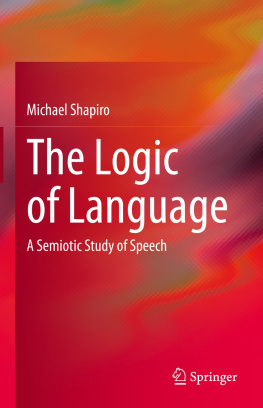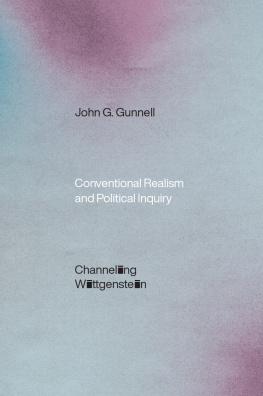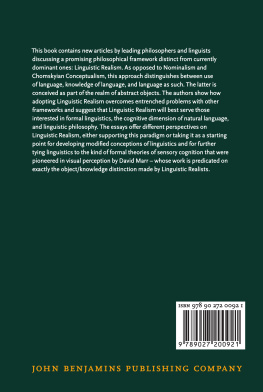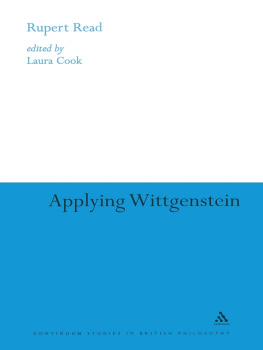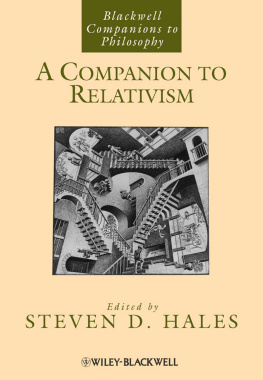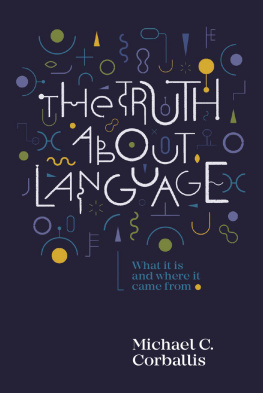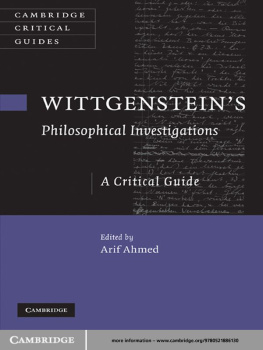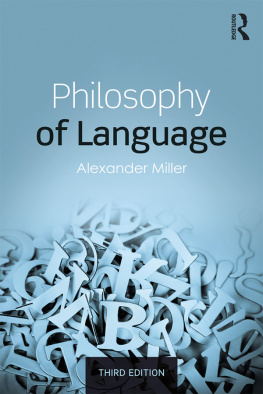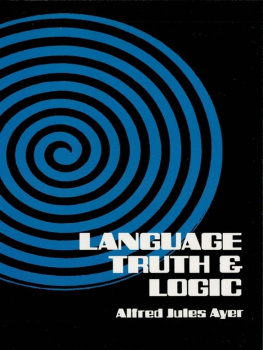Dummett, Michael Emeritus Professor of Philosophy, University of Oxford
The Seas of Language
Publication date 1996 (this edition)
Print ISBN-10: 0-19-823621-2
Print ISBN-13: 978-0-19-823621-4
doi:10.1093/0198236212.001.0001
Abstract: The book contains articles in metaphysics and philosophy of language written between 1975 and 1992. Dummett defends the verificationist theory of meaning, according to which in order to know the meaning of a statement one must be in possession of a procedure to verify it. He also argues for the link between bivalence and the metaphysical doctrine of realism. Other topics discussed include refutation of instrumentalism, mathematical applicability, backward causation, and the analysis of the concept of existence.
Keywords: anti-realism,bivalence,causation,Davidson,Michael Dummett,Frege,meaning,Quine,realism,theory of meaning,verificationism,Wittgenstein
The Seas of Language
end p.i
end p.ii
The Seas of Language
CLARENDON PRESS OXFORD
end p.iii

Great Clarendon Street, Oxford ox2 6dp
Oxford University Press is a department of the University of Oxford
It furthers the University's objective of excellence in research, scholarship,
and education by publishing worldwide in
Oxford New York
Auckland Bangkok Buenos Aires Cape Town Chennai
Dar es Salaam Delhi Hong Kong Istanbul Karachi Kolkata
Kuala Lumpur Madrid Melbourne Mexico City Mumbai Nairobi
So Paulo Shanghai Taipei Tokyo Toronto
Oxford is a registered trade mark of Oxford University Press
in the UK and in certain other countries
Published in the United States by
Oxford University Press Inc., New York
Michael Dummett 1993
The moral rights of the authors have been asserted
Database right Oxford University Press (maker)
First published 1993
First issued as paperback 1996
All rights reserved. No part of this publication may be reproduced,
stored in a retrieval system, or transmitted, in any form or by any means,
without the prior permission in writing of Oxford University Press,
or as expressly permitted by law, or under terms agreed with the appropriate
reprographics rights organization. Enquiries concerning reproduction
outside the scope of the above should be sent to the Rights Department,
Oxford University Press, at the address above
You must not circulate this book in any other binding or cover
and you must impose this same condition on any acquirer
British Library Cataloguing in Publication Data
Data available
Library of Congress Cataloging in Publication Data
Dummett, Michael A. E.
The seas of language/Michael Dummett.
Includes index.
1. Language and languagesPhilosophy. 2. Metaphysics.
I. Title.
P106.D86 1993 121'.68dc20 93-933
ISBN 0-19-824011-2
ISBN 0-19-823621-2 (Pbk.)
end p.iv
To
Paul, Virginia, Charlotte, Hannah, and Esther
end p.v
See how high the seas of language run here!
(Wittgenstein, Philosophical Investigations I. 194)
end p.vi
Preface
This book contains almost all my articles and essays on metaphysics and the philosophy of languagetwo branches of philosophy that I regard as closely intertwinedthat have been published or are shortly to be published and were not contained in Truth and Other Enigmas (London, 1978) or in Frege and Other Philosophers (Oxford, 1991). It also contains one essay, 'Could there be Unicorns?', not previously published in English, and two neither forthcoming nor previously published in any language. Of these, 'Truth and Meaning' was written for publication; the other is my valedictory lecture 'Realism and Anti-Realism'.
Apart from the publication of matter not published previously, the chief purpose of such a collection as this is the convenience of readers, who no longer have to strive to remember in which journal or book a given article or essay was published, nor to go from one to another if they are wishing to read more than one of them at a time. (It is also a great convenience to the author, who no longer has to keep messy and incomplete piles of offprints; but that is obviously an inadequate justification for publishing such a book.) A further purpose is to introduce readers to some articles or essays they had previously missed; the author hopes, moreover, that they will be prompted to reread some that they had not missed but have now largely forgotten.
Among the earliest of the items in this collection to be written are 'Does Quantification Involve Identity?' and 'Mood, Force, and Convention', both composed in 1976 and intended for Festschrifts, the former for one in honour of Peter Geach and the latter for one in honour of Donald Davidson. Those that were published earliest are the twoa lecture and an essayentitled 'What is a Theory of Meaning?', both of which appeared before the compilation of Truth and Other Enigmas. They were excluded from that book because at the time I intended to make them the first two chapters of a short book, with, perhaps, only one other chapter. That project was never carried out, because, by the time that I might have started work on the third chapter, 'What is a Theory of Meaning? (II)' no longer seemed to me satisfactory. Some evidences of this dissatisfaction appear in other essays included here, for instance in 'What do I Know when I Know a Language?' It is to the two essays called 'What is a Theory of Meaning?' that I shall principally direct my comments in this Preface.
From the start, I have felt an awkwardness about the first of the pair, for the following reason. My memory was, and is, that I experienced great illumination from listening to a discussion after a lecture of Donald Davidson's which I attended when on a visit to the United States. In the course of this discussion, as I remember it, Davidson answered an objector by saying
end p.vii
that, according to his conception of a theory of meaning, such a theory was not intended to convey the concepts expressible in the object-language, but to convey an understanding of that language to one who already had those concepts. This struck me as a luminous way of expressing his idea of what he was after in his discussions of a theory of meaning, and also as focusing very precisely on the difference between the ways he and I conceived of such a theory. The two of us each contributed to a series of Wolfson Lectures held in Oxford in 1974 (and published as Mind and Language, edited by Samuel Guttenplan, Oxford, 1975); by an odd coincidence, out of the six lecturers, all but the two Americans were Catholics, although you could not have inferred that from their lectures. When I came to compose my lecture, I decided to treat of the conception of a theory of meaning I remembered Davidson to have expressed with such clarity, and borrowed that formulation for my characterization of what I called a 'modest' theory of meaning: but I was embarrassed whether or not to acknowledge the source of the formulation. On the one hand, I surely owed it to Davidson to do so; on the other, it is unfair to saddle people in public, and particularly in print, with things they said in discussion, which may well not have expressed their considered view. In the event, I decided, with some uneasiness, not to make any acknowledgement. I was later relieved, but at the same time greatly surprised, when Davidson, in informal conversation, declared that he had never intended a theory of meaning, as he conceived it, to be modest in my sense, and had never asserted it to be. My memory is extremely unreliable; in particular, I have often discovered that people never said what I thought I remembered them as saying. One possibility, therefore, is that Davidson had not said what I remembered as having afforded me so much illumination, and that I misunderstood him at the time or misremembered him later. Another, of course, is that


